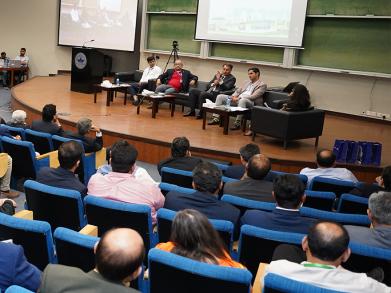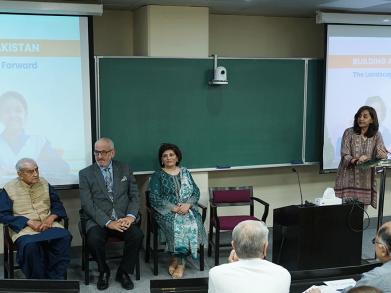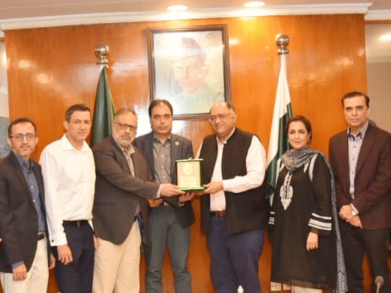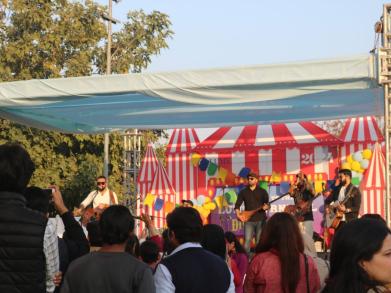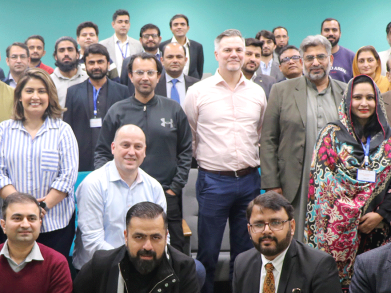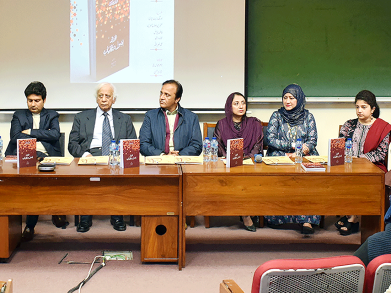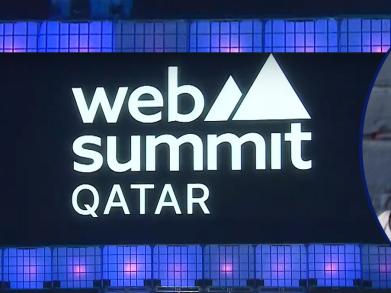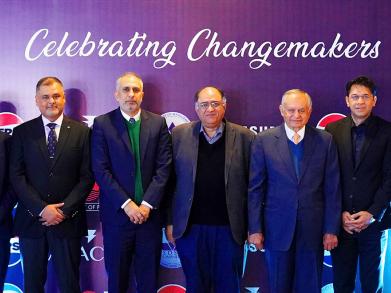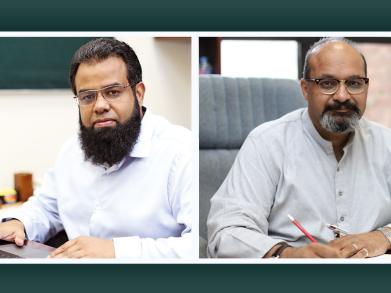Centre for Business & Society’s 3rd International Interdisciplinary Conference on Gender, Work & Society Attracts International Academics & Practitioners
The Centre for Business and Society’s 3rd International Interdisciplinary Conference on Gender, Work and Society (ICGWS) started off on May 21 with an inspiring address by Justice Ayesha A. Malik, the first female judge of the Supreme Court of Pakistan. Ms. Malik was one of the two keynote speakers at the two-day conference themed ‘Future of Equalities, Diversity and Inclusion (EDI) in South Asia and Beyond’.
The hybrid conference, hosted at the Suleman Dawood School of Business (SDSB), LUMS is the third in the ICGWS series. Previous conferences, held in 2017 and 2019, brought together academics, researchers and scholars from across the globe and this year’s conference aimed to carry on this legacy by immersing itself in the multidisciplinary themes around gender, work and society.
The conference was inaugurated by Dr. Alnoor Bhimani, Honorary Dean, SDSB and Dr. Arshad Ahmad, Vice Chancellor, LUMS. Dr. Bhimani’s inauguration address appreciated the legacy of gender conferences with their distinct themes that aim to increase efforts to build a more inclusive community through research, practice, and awareness. He praised the variety of scholarship on gender and related areas and spoke about the evolution of feminism.
“The term gender is relatively recent; 60 years old. But the first feminist dates back to the 14th century. Christine de Pizan is often presented as one of the first feminists in history who advocated education for women. It took 300 more years for other voices to emerge. Increased female voices advocating for women were calls for enabling women to thrive in society on their terms. Eventually people became more open to women representing themselves differently than men view them. Another perspective that emerged was how different women have different experiences and how the society and institutions view them. This has given rise to more research and an increased interest in women’s studies. The term ‘intersectionality’ has come up, which studies women of colour or a certain background or disabled and how they are treated in society. I think it’s difficult to be a gender scholar and not be an activist as it is hard to separate the two.”
Dr. Ahmad also addressed the conference participants and welcomed Justice Ayesha Malik. He shared the progress of LUMS over the years. “We are celebrating the 35th anniversary of LUMS. We have come a long way from 45 students in a one kanal house in Gulberg to a 100 acre university offering 42 programmes across five schools. This makes us a comprehensive university with 5000+ students, some 340 faculty members and 900 staff members. It’s a miracle to see what happens in hundreds of years has happened in three decades.”
He added that we wish to stay a small university and make an impact. “Small can be impactful; if you focus your efforts on a mission you believe in. When you are in a country with the 6th youngest and biggest population in the world, you make an impact through diversity and inclusion. We have done this through our National Outreach Programme. It reaches out to over 140 cities, towns and districts in the country; from Turbat all the way to Skardu. The Programme inducts students on over 100 per cent scholarship. This is what changes lives. When these graduates go out and join the work force in the public and private sectors, start-ups and various organisations, they change their communities and hometowns for the better.”
Dr. Ahmad also congratulated Dr. Bhimani and his team on the various initiatives ongoing at the School especially the women’s scholarships. “LUMS is the only university in the world that offers a 50 per cent scholarship to every female that joins its business school graduate programmes. This has changed the dynamics of the classrooms. The questions that are asked are changed. The way the instructors interact has changed. The case studies and the questions that drive learning are constantly evolving because of the new classroom dynamics.”
Justice Ayesha A. Malik’s address shed light on the struggles and achievements of women in the country and how a holistic and strategic approach is necessary to propel the country towards a more equitable and inclusive society. She said that this is a topic very close to her heart and speaks to her personal journey and experiences. “It is very difficult to talk about gender and inclusivity and equality. I’m very happy to be here addressing a business forum because I believe that people who are involved with economics, finance and policy should also know about what is happening on the legal side, in our courts so there is no disconnect.”
“When I was appointed to the Lahore High Court in 2012, I was the only woman on the bench and when I left in 2022, we were two out of 50. That’s the progress we had made in all these years. I am the first woman in the Supreme Court of Pakistan in 75 years. Whereas in the region, there are many. Therefore, this topic, gender, work and society is important to me. We need to ask ourselves why it took us so long to start a debate and why we are talking about equality now in 2022. Why do we need to discuss inclusion and diversity? I’ll tell you why. Women today still need to create space. They need space for themselves. They need space that recognises and acknowledges the gender. They do not need space that is made by a society where the rules are made by men, for men. Women now need to work on changing the narrative. We need a new voice. We need a voice that calls out to the gender perspective. We need a voice that calls out to the women’s stories, to their experiences and we need those included in the work that we do, in all our conversations and in the folds of society. We need those brought on to the decision-making table. Most importantly we need to draw attention to the issues that lead to inequality and that lead to a lack of inclusion,” stressed Justice Malik. She also narrated her own personal experiences, discussed how she came to the historic decision on the infamous two finger test in rape cases and how she dealt with the case on having a quota on women’s admission in medical colleges.
The keynote address was followed by a series of parallel sessions which consisted of presentations from scholars on various gender themes. Building on the overarching theme of the conference that explored gender in both contexts of work and society, an event was held at the end of Day 1 to celebrate the launch of vending machines for sanitary products at LUMS and to have a pertinent conversation to commemorate International Menstrual Hygiene Day (an annual awareness day on May 28). The launch of the sanitary products vending machine was a revolutionary step towards creating a more inclusive space for women inside the university premises. Dr. Zubair Khalid, Assistant Professor, Syed Babar Ali School of Science and Engineering; Dr. Alnoor Bhimani and Dr. Arshad Ahmad gave their remarks at the launch event.
The discussion, titled ‘Workplace Diversity and Inclusion: A Panel Discussion on Menstruation and Menopause in Different Workplaces’, featured Farah Ahamed, Human Rights lawyer and writer; Radha Paudel, CEO of Global South Coalition for Dignified Menstruation, writer and activist; Amna Mawaz Khan, classical dancer, theatre artist and political activist and Dr. Ayra Indrias Patras, Assistant Professor and activist, as panellists. The talk explored the physical and psychological exertions of women who experience a lack of accessible hygienic products in the workplace and the effects of menopause on their personal and professional lives.
On day two of the conference, Prof. Dr. Asghar Zaidi, Vice Chancellor, Government College University, Lahore, gave his keynote address on gender, work, and societal implications of population ageing. His research on the increasingly ageing population and its associated repercussions on socio-economic dynamics was an eye opener for the audience and promoted awareness on the crucial need for further research and action-oriented advancements in this area.
Overall, the conference consisted of 12 interactive sessions that featured the work of 48 researchers (in-person and online), rooted in interdisciplinary themes surrounding gender diversity. The themes ranged from Gender Identity and Expression to Religion and Ethnic Minorities, Money and Management, Education and Employment, and Harassment and Violence. These research papers were approved after a thorough review process that engaged faculty experts from across the board. The conference concluded with three ‘Best Paper Awards’ chosen after a careful nomination process led by the session chairs and the conference committee chairperson, Dr. Faiza Ali, Associate Professor, SDSB.
Throughout the two-day event, the 3rd ICGWS was driven by its objective of providing a platform to new research and disciplines that will go on to play a critical role in revolutionising the course of gender in the scope of work and society. Overall, the conference successfully carved out a legacy for future conferences to continue to provide platforms for further advancements in the field of gender.















